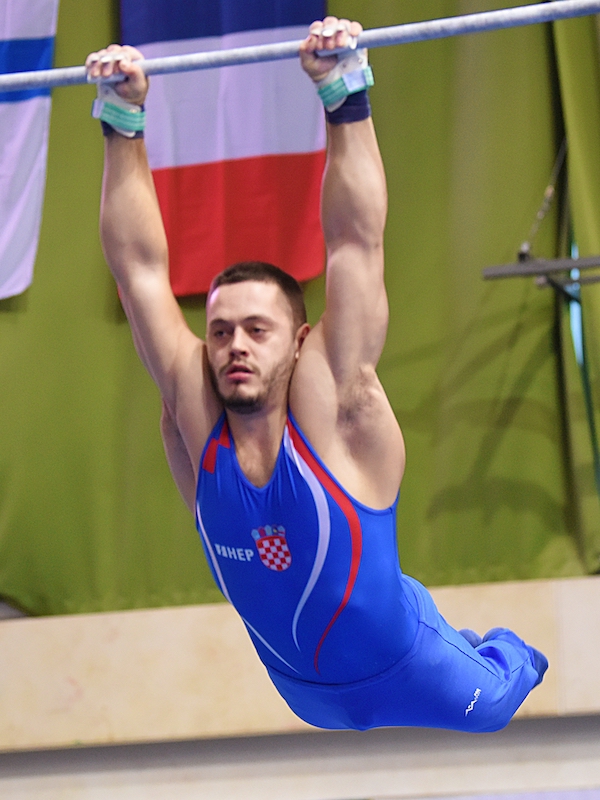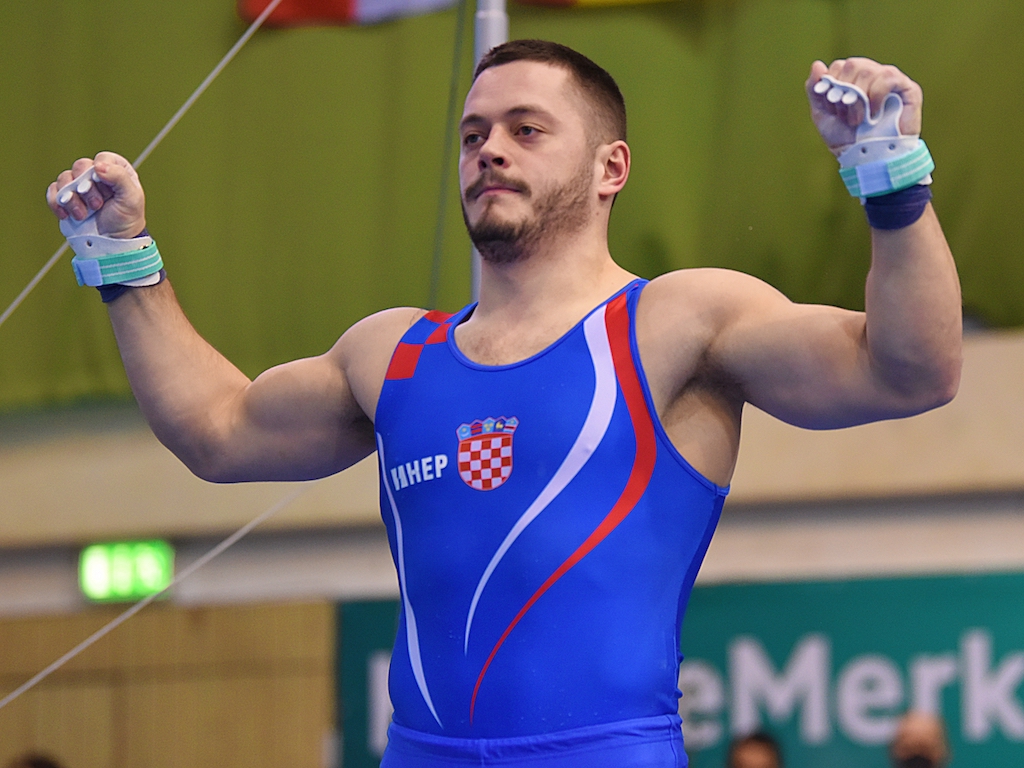Croatian-Czech Friendship Association Celebrates 30th Anniversary
28 February, 2022 - The Croatian-Czech Friendship Association on Sunday celebrated the 30th anniversary of its existence with a concert at the Croatian National Theatre and the 30th anniversary of the international recognition of Croatia and establishment of diplomatic relations with what then was the Czech and Slovak Federative Republic.
The concert was held under the aegis of the Czech Embassy with the support of the Croatian Ministry of Foreign and European Affairs and the AŽD Zagreb company, and featured Czech violinist Jan Talich and Croatian musicians Goran Končar (violin), Aleksandar Milošev (viola) and Petra Gilming (piano). The concert was dedicated to Zlatko Stahuljak (1933-2021), the first president of the Croatian-Czech Friendship Association and Croatia's first ambasador to the Czech Republic, as well as a violinist and music teacher.
The recognition of Croatia by the Czech and Slovak federation opened a new chapter in the history of Croatian-Czech relations, which began in the late 11th century with the arrival of the Czech Duh to serve as the first bishop of Zagreb, the association's president Marijan Lipovac said.
Croatian-Czech relations had thrived in all areas of life, notably in business, tourism, politics, sports and through marriages, and what was missing was official diplomatic relations between the two countries, a Croatian embassy in Prague and a Czech embassy in Zagreb, which came to pass 30 years ago, he added.
"It is with pride and satisfaction that we share this community with the friendly people of Croatia. Yes, Czechs and Croats are natural and friendly partners, and so it was only logical that Czechs, together with Slovaks, were part of the process and active advocates of the international recognition of Croatia. I am pleased to see that relations between our two countries are being built on the most natural foundations - on a civic principle and interpersonal contacts," Czech Ambassador Milan Hovorka said.
The Croatian-Czech Friendship Association has about 100 members and branches in the southern coastal town of Omiš and the eastern town of Daruvar. In its work it most often cooperates with Czech minority associations in Croatia, in particular with Češka Beseda in Zagreb.
HNL Round 25 Recap: Osijek Tops Dinamo, Rijeka Beats Hajduk at Poljud
February 28, 2022 - The 25th round of the Croatian First League was played from February 25 to 27, 2022. This round saw two of Croatia's biggest derbies - between Hajduk and Rijeka, and Osijek and Dinamo. Here's our HNL round 25 recap.
Slaven Belupo v. Hr. Dragovoljac (1:0)
Slaven Belupo and Dragovoljac opened the 25th round in Koprivnica on February 25, 2022, in front of 753 fans.
The only goal of the match came in the 64th minute from a Brkovic penalty.
Belupo is currently in 6th place with 29 points, while Dragovoljac is in last place with 10.
Lokomotiva v. Gorica (2:0)
Lokomotiva and Gorica met on Saturday, February 26, 2022, in Zagreb in front of 319 fans.
Kulenovic scored Lokomotiva's first goal for 1:0 in the 18th minute. Pivaric missed a penalty in the 60th minute, though Dabro increased Lokomotiva's lead to 2:0 in the 72nd minute, which was the final score.
Lokomotiva is currently in 5th place with 32 points, while Gorica is in 7th place with 29.
Hajduk v. Rijeka (1:3)
Hajduk and Rijeka met in the Adriatic Derby at Poljud on Saturday, February 26, 2022, in front of 11,453 fans.
Drmic put Rijeka in the lead in the 17th minute, before Vuckic made it 0:2 for Rijeka in the 33rd. Livaja put Hajduk on the board in the 69th minute for 1:2, though Kresic secured Rijeka's 1:3 victory in the 86th minute.
Hajduk is currently in 4th place with 47 points and a game in hand, while Rijeka is in 3rd with 49.
Sibenik v. Istra 1961 (2:1)
Sibenik and Istra met in Sibenik on Sunday, February 27, 2022, in front of 776 fans.
Drena Beljo scored moments before the halftime whistle for 0:1 Istra. Marin equalized in the 53rd for 1:1, before Delic scored for 2:1 and the Sibenik win in the 63rd minute.
Sibenik is currently in 8th place with 26 points, while Istra is in 9th place with 22.
Osijek v. Dinamo (1:0)
Osijek and Dinamo closed out the 25th round with the highly anticipated match for first place on Sunday, February 27, 2022, in front of 6,676 fans.
The only goal of the match came in the 77th minute thanks to Osijek's Mance.
Osijek has now jumped to first place with 52 points, while Dinamo is in 2nd with 50 and a game in hand.
You can see the HNL standings HERE.
To read more about sport in Croatia, follow TCN’s dedicated page.
Tin Srbić Wins Silver at Gymnastics World Cup in Cottbus!
February 28, 2022 - Tin Srbić won the silver medal at the Gymnastics World Cup in Cottbus!
In his first tournament 6.5 months after winning a medal in Tokyo, the current silver Olympian is back on the podium. Although he started practically from the beginning and had to change his exercise almost completely due to the new regulations, nothing got in his way.
In Sunday's final in Germany, Tin scored 14,333, and only the American Brody Malone was better (14,700). The bronze medalist was Israeli Alexander Myakinin (14,100).
Slobodan Kadic
"The first World Cup after the Olympic Games according to the new rules, and I did really well. I am satisfied after this final. I managed this new exercise that we planned, with an initial grade of 5.7, and I got a solid final grade, 14,333, and deserved silver. The American was really much better today and deservedly won," said Tin from Cottbus.
This was his 23rd World Cup final in his career and his 17th medal. So far, he has won 9 gold medals, 4 silver, and the same number of bronze.
Slobodan Kadic
“We continue to build on that exercise. This is an interesting preparatory year in which I am trying to prepare a new exercise for next year and finally the Olympics. I am really very pleased with this start to the season. It went very well. Honestly, I have a problem with one injury, so it distracted me a bit from the finals and everything, but I concentrated on the new elements that I managed to do great. I hope that this injury will not affect me much in further preparation."
Slobodan Kadic
Tin and the rest of the Croatia team in Cottbus - gold Filip Ude, silver Aurel Benović and Jakov Vlahek, as well as coaches Vladimir Mađarević, Lucijan Krce, and Igor Križimski and judge Boris Čulin will fly to Doha on Monday where a new tournament from the World Cup series, which qualifies for this year's World Cup, awaits them.
Slobodan Kadic
"It simply came to our notice then. I hope for the same competition as this, to do this new exercise twice again and to be more prepared for the future. I hope that the injury will not get worse and that we will be able to continue training normally and build the exercise."
Tin also commented on the current political situation.
"We are talking about the situation in Ukraine all the time. I have nothing to philosophize about but to say what any normal person can say, and that is that I think it makes no sense, it never made sense in the war, let alone now in 2022. I see no reason for that. Maybe it affected us all a little bit here, it felt like something was going on. Yesterday, before the finals, the Belarusian flag was removed from the wall, the Belarusian anthem was not played ... I just hope that all this will end as soon as possible," said the silver Olympian.
To read more about sport in Croatia, follow TCN’s dedicated page.
Vueling Dubrovnik Flights Return at Beginning of March!
February 28, 2022 - The latest flight news to Croatia as Vueling Dubrovnik flights from Barcelona return at the beginning of March!
Spanish low-cost airline Vueling Airlines resumes traffic on the regular line between Barcelona and Dubrovnik from the beginning of March, reports Croatian Aviation.
The Spanish airline planned to operate on the Barcelona-Dubrovnik route throughout the winter, but due to passenger restrictions and reduced demand, this did not happen.
The last flight on this line was made by Vueling on January 9, after which there were no regular operations. The carrier is reintroducing this route before the start of the summer flight schedule, which will take effect at the end of March.
From March 3, Vueling will operate on this line twice a week, on Thursdays and Sundays. Eight return flights were announced in March, with a total of 2,880 seats on offer. The carrier will use A320 aircraft on this route.
In addition to Dubrovnik, Vueling will travel from Barcelona to Split and Zagreb this summer.
Furthermore, Croatian Aviation recently reported that Flyr, a new Norwegian airline based in Oslo, announced a new line between Oslo and Dubrovnik this summer.
Namely, Flyr will introduce its third flight to Croatia and the first to Dubrovnik Airport this summer. The new Oslo-Dubrovnik line will start operating on June 13 and end on August 12 this year. Two flights a week have been announced, every Monday and Wednesday, while the number of weekly rotations will increase to three from July 1, with the introduction of regular flights every Friday.
On 25 return flights in the mentioned period, Flyr offers a total of 9,450 seats between Oslo and Dubrovnik. The new route will be operated by B737-800 aircraft with a capacity of up to 189 seats in the cabin.
For more on flights to Croatia and other travel announcements, make sure to check out our dedicated travel section.
Croatian Bus Carriers Available to Croatian Government for Ukrainian Refugees
February 28, 2022 - The largest Croatian bus carriers, Arriva and Čazmatrans, as well as other carriers included in the Association of Croatian Bus Liner Carriers (UHAJLP), announced that due to the situation in Ukraine and the increased number of refugees from the war zone, they are ready to make their fleet available to the Government of the Republic of Croatia, the Civil Headquarters, and the Croatian Civil Cross to provide the highest quality and fastest possible assistance.
The carriers are ready to hand over their buses and drivers to transport refugees from Ukrainian border areas to Croatia.
"The refugee crisis is at the door; we are currently witnessing huge crowds and hundreds of thousands of people fleeing Ukraine in various ways. We want to contribute to human resources and vehicles because it is our responsibility and the only way refugees can be organized and efficiently transferred from the Ukrainian border to designated locations in Croatia. Numerous counties have announced that they already have prepared capacities to accommodate hundreds of victims. We, therefore, call on them to contact us in coordination with the Civil Headquarters so that we can transfer more refugees to the locations they have envisioned. We are also at the disposal of the Government of the Republic of Croatia for everything else that is needed to resolve this crisis," said Dražen Divjak, General Manager of Arriva in Croatia, on behalf of the Association of Croatian public bus companies.
UHAJLP brings together large and small domestic private companies that make up the domestic transportation system with huge capacities, thousands of buses, and over 8000 workers. It is a system of strategic importance for the Republic of Croatia and would have been difficult to survive during the pandemic if the Government had not preserved it with its measures for the last two years. Carriers are also partners with much of the local and regional self-government. They are now ready to give back to the community in which they operate through assistance in resolving at least part of the Ukraine refugee crisis.
Source: Dalmacija Danas
For more, check out our lifestyle section.
Might SWIFT Exclusion of Russians Also Harm Some Croatian Enterprises?
February the 28th, 2022 - The European Union and powerful non-EU European countries such as the United Kingdom have imposed some of the harshest possible sanctions on Russia following its unjustified invasion of Ukraine just a few days ago. The exclusion of Russia from the SWIFT system is among the harshest, but could it have negative effects for Croatian enterprises as well?
As Jutarnji/Novac/Vedran Marjanovic writes, Croatian consultant Goran Saravanja explained that Russia's exclusion from SWIFT is primarily aimed at financially depleting the Russian Federation, hindering the international trade of the Russian economy, its exports, but also the import of what it lacks. Economist Drago Jakovcevic, however, warned that Croatian enterprises will also suffer as a result of the move, for example, in the form of the collection of goods delivered to Russia.
How the expected expulsion of Russia from the international SWIFT system for financial transactions will be seen in practice remains to be seen, but the consequences will certainly be borne by Croatian enterprises which have to charge for their exported goods to Russia.
''The exclusion of Russia from SWIFT is certainly a fair measure towards Russia, because such aggression against one country, as Russia has undertaken against Ukraine, has not been seen since World War II. This is the least that can be done out of solidarity with Ukraine,'' Jakovcevic said in reference to the decision of the United States and its allies here in Europe to expel Russia from the SWIFT system.
The full name of the SWIFT system is the Society for Worldwide Interbank Financial Telecommunication and it serves commercial banks and other financial service providers as a communication platform and not, as can often be heard, as an international payment system. The expulsion of Russia from SWIFT means that for all those who do business with Russia, business operations will be much more difficult, expensive and uncertain. This includes a list of Croatian enterprises which are now in difficult circumstances.
''The announced exclusion of Russian banks from the SWIFT system is part of a package of sanctions that the EU, the UK and the US have already imposed or intend to impose on Russia, so the decision in relation to SWIFT should be viewed in this context,'' commented consultant Goran Saravanja, adding that that context is the financial depletion of Russia.
''We can see that energy and food are currently excluded from Russia's sanctions, as resources that can be imported from that country. If we talk about the effects of excluding a country from the SWIFT system, we should take into account the fact that Russia isn't actually the first country to have this happen to them, one other example is Iran. And as we know, even after being expelled from SWIFT, Iran continued, for example, to export oil, recording, however, a significant drop in revenue,'' Saravanja noted.
Drago Jakovcevic pointed out that the expulsion of Russia from SWIFT, which is imminent, will not only affect Russian banks, but also companies and regular residents of that enormous country.
''Pulling Russia out of SWIFT has the function of discouraging it, making it more expensive and making doing any business with Russia much more difficult. Apart from Russia's economic and financial isolation, its exclusion from the SWIFT system has the function of preventing those in the rest of the world who are now preparing to make money from the devaluation of the ruble from doing so,'' Jakovcevic pointed out.
In support of the statement is the statement of former Russian Finance Minister Alexei Kudrin that the expulsion from SWIFT could cost Russia a drop in its GDP by five percent a year. Kudrin made the statement during one of the previous announcements of the USA and its allies that Russia would be expelled from SWIFT, but that the move was very appropriate for the current moment since the SWIFT blockade is just one form of the latest portion of sanctions against Moscow for attacking Ukraine.
For more on Croatian enterprises, check out our business section.
Which Croatian Companies Will Feel Direct Consequences of Ukraine Conflict?
February the 28th, 2022 - Some Croatian companies will end up feeling direct consequences as a result of the recent Russian invasion of Ukraine, and as the situation continues to escalate in that Eastern European county, it's difficult to predict how hard those consequences will be to deal with.
As Poslovni Dnevnik writes, Petrokemija, Ad Plastik, Prvo plinarsko drustvo (PPD), Span, Jadran Galenski Laboratorij, Fortenova Group and Sberbank… are just some of the business entities that will be directly affected by Russia's attack on Ukraine, Vecernji list reported.
Last year (during eleven months), Croatian companies exported goods worth 1.36 billion kuna to Russia and 362 million kuna to Ukraine. The value of imports from Russia doubled in one year, to 3.3 billion kuna, probably due to the significantly higher prices of energy, gas and fuel.
Imports from Ukraine stood at around 280 million kuna. When it comes to gas, Croatia is entering a precarious group of countries that are heavily dependent on Russian gas imports, which are still flowing underground while Russian boots spend their time trampling all over everything on neighbouring Ukrainian soil.
Only about one percent of Croatia's merchandise exports go to Russia, so the eventual loss of part or all of the revenue will not result in any shocks or a recession, but it would certainly be a blow to Croatian companies that have struggled for years to be present on what is typically a very difficult market.
The blow to Croatia and Croatian companies will come indirectly, first through inflation and the spillover of the costs of the war on energy and food. The annual inflation rate in Croatia is already at almost six percent, and food and energy are its big generators. Croatia is dependent on imported gas (imports 70 to 75 percent), oil and electricity, but also food.
Russia and Ukraine hold a quarter of the world's entire wheat production, a fifth of the corn production and four-fifths of sunflower oil production. Ukraine is the world's largest producer of sunflowers and potatoes, the sixth largest producer of corn and barley, followed by rye and soybeans, which immediately raised prices on agricultural commodity exchanges.
In addition to higher prices, shortages are possible, which will work to dispel dreams and plans about inflation as a short-term phenomenon that will dissipate by summer and which could be responded to with a one-time package, no matter how expensive that package of measures might be. While waiting for technical instructions and details on sanctions against Russia, Croatian companies are currently putting out the fire, writes Vecernji list journalist Ljubica Gataric.
For more, check out our business section.
New Zagrebacka Banka Instant Payment Option Introduced for Clients
February the 28th, 2022 - A brand new Zagrebacka banka instant payment service has been introduced for the clients of this Croatian bank, be they business or private customers.
As Poslovni Dnevnik writes, Zagrebacka banka has introduced a new instant payment service for all its private and business users who have transaction accounts with the bank, and the new Zagrebacka banka instant payment service will be able to be used for up to a maximum of 100,000 kuna. Instant payments in Croatia can be made in the Croatian national currency (kuna), and can be carried out every day, including during weekends, over bank holidays and on public holidays.
Clients of Zagrebacka banka will thus be able to execute their transactions in almost real time, meaning in just a few seconds. Instant payments are made by online banking via a mobile application (m-zaba) and the Internet (e-zaba), through existing forms of Zagrebacka bank account, and then by checking the ''instant payment'' option.
Filling out Zagrebacka banka instant payment orders will be exactly the same as it is with standard payment orders, and the payer can immediately see if their payment has been successfully completed and sent to the correct individual.
For example, if a client needs to pay money on Friday night to a person who has a transaction account with another bank, it would have been an issue owing to bank processing times. Until now, it would have been necessary to wait until Monday to see the money appear in the desired bank account.
Now, with the introduction of this new Zagrebacka banka instant payment service, the money heading for the recipient's account will be available immediately. Payments are made through NKSInst, a national clearing system for instant payments developed by the Financial Agency (Fina) and approved by the Croatian National Bank (CNB/HNB).
For more on Croatian banks and their services, make sure to check out our dedicated lifestyle section.
Vlatko Cvrtila Talks Possible Balkan Consequences of Ukraine Crisis
February the 28th, 2022 - Croatian geopolitics expert Professor Vlatko Cvrtila has discussed the current conflict between Russia and Ukraine following Russia's unjustified invasion of that Eastern European country. He also touched on potential Balkan consequences of the war.
As Poslovni Dnevnik writes, Geopolitics expert Professor Vlatko Cvrtila spoke about the current and escalating situation in Ukraine on N1 television, where he went deeper and analysed the Russian invasion of Ukraine. He commented, among other things, on how the Russian-Ukrainian crisis could affect the Balkans.
"We're now in a version of the Cold War 2.0. We know how things were back during the Cold War. In addition to opposing ideologies and policies, each side sought to pursue its interests in some undefined territories in the world. These are the territories where the so-called proxy wars. The Western Balkans, that is, our region, is one of those areas, and as such it's another area in which Vladimir Putin would try to possibly sabotage those efforts of the West,'' Professot Vlatko Cvrtila said, and continued:
"The biggest concern is that it could potentially happen here in Croatia's region, given that there are countries and political structures that are very sympathetic to Putin and Russia, and here I mean primarily Serbia, but also Bosnia and Herzegovina, where Dodik has been seriously shaking things up for six months in that country in terms of announcing the exit of those institutions that were founded by the Dayton Agreement, and the Dayton Agreement was what stopped the war,'' he explained.
Vlatko Cvrtila also commented on whether one of the consequences of the Russian invasion of neighbouring Ukraine would be the formation of a European army.
"I'm not optimistic that it will be something that will form rapidly, but to the question of whether or not there'll be some strategic changes... there certainly will,'' Professor Vlatko Cvrtila concluded.
For more, make sure to check out our dedicated politics section.
Public Humiliation, the Old-Fashioned Way: Pillars of Shame in Croatia
February 27th, 2022 - Public shaming nowadays mostly takes place on social media, so we tend to forget that it once used to have a much more tangible form. Have you ever seen a pillar of shame in Croatia?
In a village called Salež, not far from Buzet town in Istria, stands a solemn monolith. A human figure carved in stone, weathered and overgrown with moss.
It’s not an old deity you’re looking at, but a pillar of shame, a once popular tool for punishment by public humiliation.
Transgressors of all kinds were tied or chained to stone pillars, typically set up on town squares or other public places of gathering, and left to the mercy of the mob. The more severe the offence, the longer the convicts had to endure the misery, with more serious crimes often warranting corporal punishment on top of the humiliating public exposure.
 Pillar of shame in Salež, Istria / Buzet Tourist Board Facebook
Pillar of shame in Salež, Istria / Buzet Tourist Board Facebook
Pillars of shame existed all over Europe, Croatia being no exception. Public shaming was judicially sanctioned until emperor Joseph II banned it as a method of criminal punishment in the 18th century.
The practice lived on in other ways; most recently, it moved to the virtual space where it assumed a more insidious form. Social media only seems to instigate the mob mentality, and gone are the days of public punishment lasting an hour or two - your past transgressions are forever saved for anyone to find. The internet never forgets, and the old stone pillars and chains almost seem benign in comparison.
In Croatia, several pillars of shame survive to this day. The anonymous figure in Salež is arguably the most unique of the lot - and the most unsettling - as it’s the only one that has a human form.
Among the locals, the pillar is known as Berlin, getting its name after berlina, a type of four-seat carriage that once operated on the route Berlin - Paris and was used for transportation and public shaming of convicts. Berlin the pillar is made of white stone that isn’t naturally found in the area. The figure wears a cap, and is resting its left hand on his chest, on a spot once used to clip the chains with which the convicts were tied.
There’s an inscription in Latin on the front of the figure, barely visible, translating to justice to this poor province.
A local named Mate Grižančić recalls that the village elders used to speak of the pillar being brought to Salež on a carriage adorned in flowers, pulled by six of their strongest oxen. A parade of eighteen girls dressed in white followed the carriage as it rolled into town.
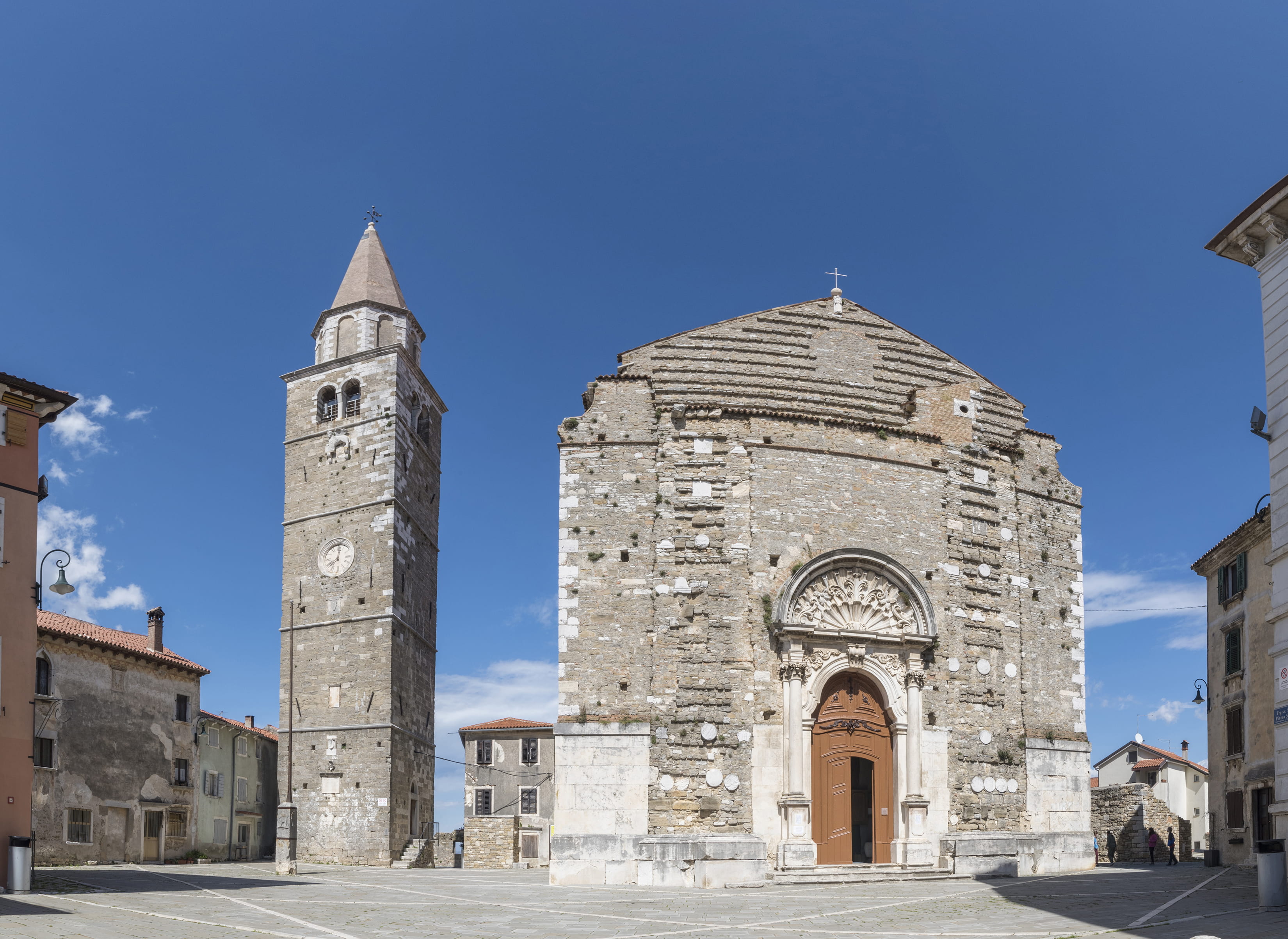 Church of St. Servulus in Buje / istra.hr
Church of St. Servulus in Buje / istra.hr
Another pillar of shame in Istria is found in Buje. The town is truly the best of both worlds where Istria is considered: it spans over two inland hills, giving off the classic Istrian-hilltop-town vibes, with the sea glimmering on the horizon as the coast is only 10 kilometres away.
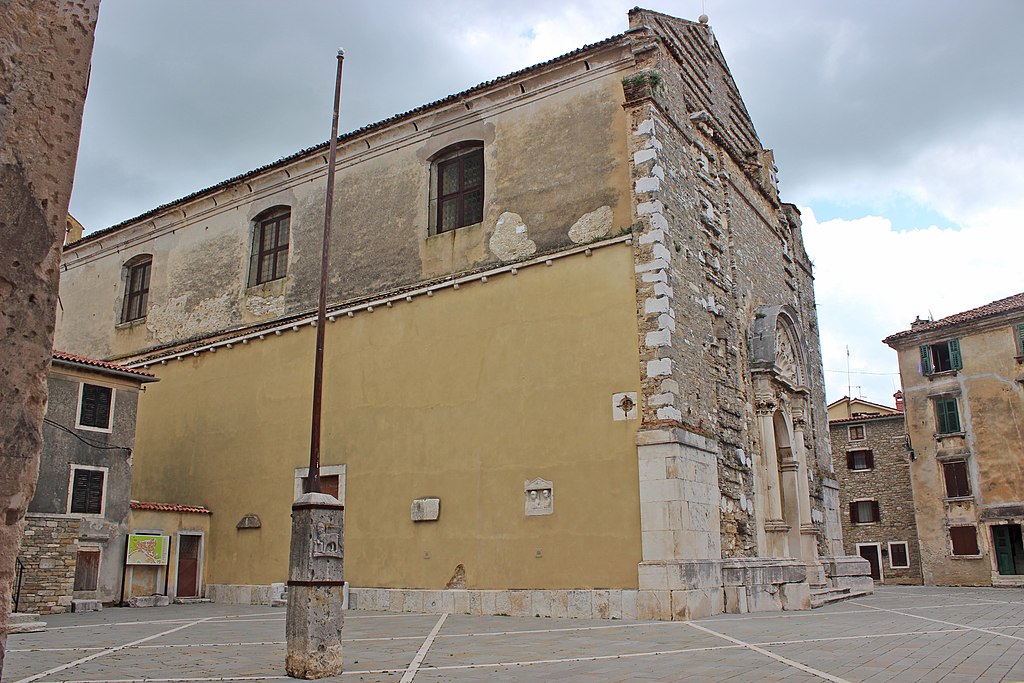 Pillar of shame, church of St. Servulus in Buje / Creative Commons
Pillar of shame, church of St. Servulus in Buje / Creative Commons
At the highest point in town, in front of the imposing Baroque church of St. Servulus, you’ll find a pillar that was reportedly used for public humiliation in the 17th century, and later as a flag pole. Spot the Venetian lion on the pillar and elsewhere in town, remnants of the long period of Venetian rule.
An honorary mention goes to Sveti Lovreč, one of the best preserved fortified medieval settlements in Istria which gets its name from the small church of St. Lawrence.
Perched in the centre of the main square is a pillar of shame that’s only partially preserved, standing on a pedestal.
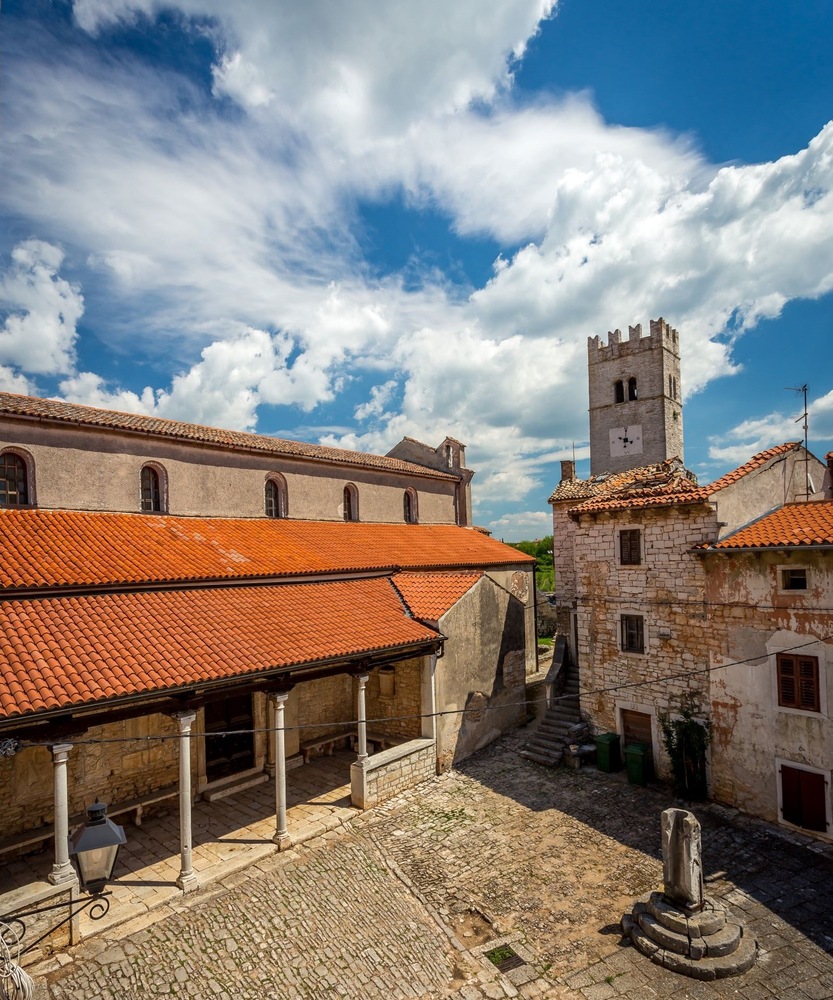 Sveti Lovreč, pillar of shame in the bottom right corner / Image by Central Istria Tourist Board
Sveti Lovreč, pillar of shame in the bottom right corner / Image by Central Istria Tourist Board
Public shaming sure seems to have been a popular method of punishment in Istria - what about the rest of Croatia?
Quite a unique landmark is found in Vinica near Varaždin. It’s locally known as pranger, named after the German term for a pillar of shame. Originally located at the Vinica fortress, the pranger was moved several times and is now installed at the Matija Gubec Square.
The three-sided pillar is slightly reminiscent of an obelisk; each side is crowned with a man’s head, carved in stone. The three faces all have different features, but share a chiselled moustache as a common trait.
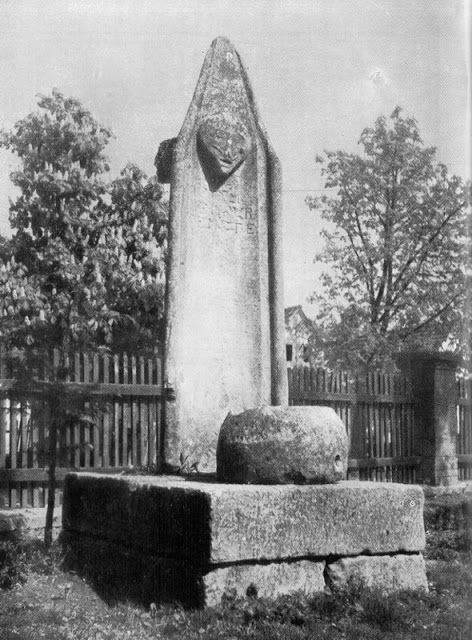 Pillar of shame in Vinica / Zagreb Nekada Facebook
Pillar of shame in Vinica / Zagreb Nekada Facebook
Next to the central figure, the year 1643 is engraved, followed by a Latin inscription:
IVSTAM MENSVR(AM) TENETE
Measure honestly, it warns. Together with the round stone vessel installed on the pedestal, the inscription points to the fact that the Vinica pillar doubled as a measuring tool. Grain and similar produce were measured with the help of stone pots since medieval times; the merchants who were caught trying to cheat their customers ended up tied to the pillar and were given a thorough thrashing - verbal or otherwise.
On the coast, a famous specimen of its kind is found in Zadar, standing at the northwest side of the Roman forum.
Given its former purpose, the slender column looks much more intimidating than its Istrian counterparts. Fourteen metres tall and ancient Roman in origin, the column was repurposed into a pillar of shame in the Middle Ages.
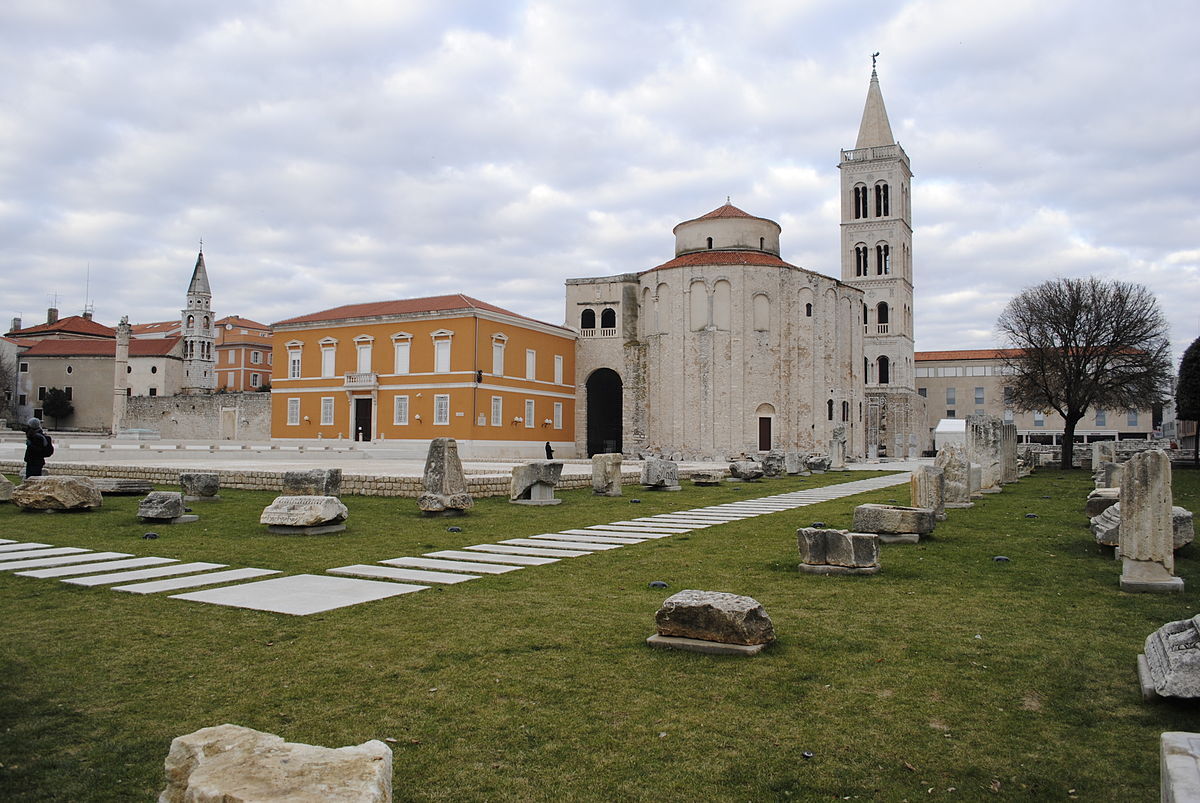 Roman forum in Zadar, pillar of shame on the left / Creative Commons
Roman forum in Zadar, pillar of shame on the left / Creative Commons
Nowadays one of the most popular spots in town, the location surely used to instil unease in the local population back in the day. Offenders of all kinds were chained to the pillar and left exposed in public for several hours on average.
Women who were caught emptying their night pots through the window or throwing any other kind of garbage into the street got an hour on the pillar. A sign was hung around their neck that read šporkulja - a title that doesn’t translate well, but indicates the woman was messy or dirty.
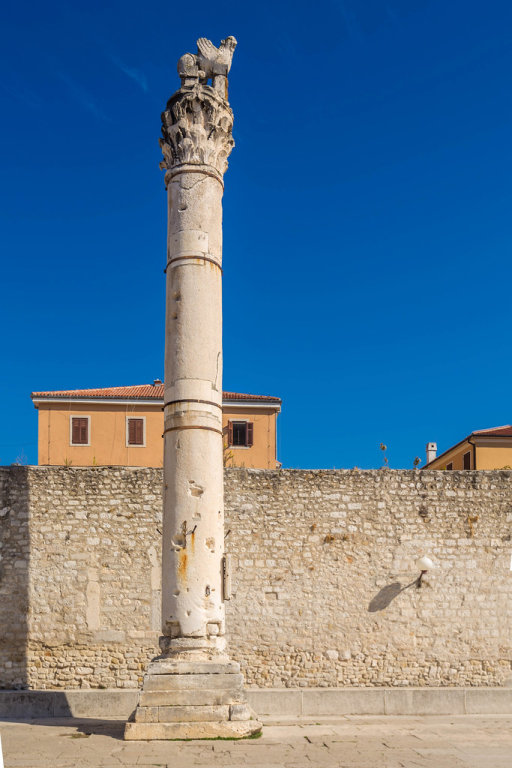 Pillar of shame in Zadar / Marco Verch, Creative Commons
Pillar of shame in Zadar / Marco Verch, Creative Commons
Other offenders were given a sign as well, listing all their transgressions; theft and solicitation were the most common offences. The gathered masses were happy to hurl insults at them, as well as a wide range of objects. If a person was accused of theft, they’d get a lashing on top of being harassed by the public.
Offenders were often forced to pay a fine for the privilege of pillar use after the entire ordeal - a whole new level of adding insult to injury.
Further south, in the town of Omiš famed for its pirates, a pillar of shame stands on a square near the river Cetina. The final item on our list, the elegant column bears the insignia of the Venetian general, and it’s believed it dates to the 17th century.



